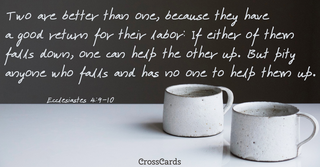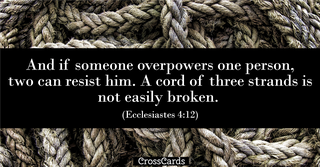
Change Translation
- Recent Translations
- All Translations
Eclesiastés 4:10
Share
Listen to Eclesiastés 4:10
Settings
Scripture Text Size
10
Porque si cayeren, el uno levantará á su compañero: mas ¡ay del solo! que cuando cayere, no habrá segundo que lo levante.
Eclesiastés 4:10 Meaning and Commentary
Ecclesiastes 4:10
another to help him up;
no companion to raise him up when fallen; no Christian friend to visit and comfort him when sick, to relieve him under his necessities, when poor and afflicted, or to recover him from errors in judgment, or immoralities in practice; and especially if he has not Christ with him to raise him up, keep, and uphold him.
For if they fall, the one will lift up his fellow
That is, if anyone of them fall, the other will lift him up, as they are travelling together, in whatsoever manner; if one falls from his horse, or out of his carriage, or into a ditch, the other will endeavour to raise him up again: this, as it is true in a natural, so in a figurative and metaphorical sense, with religious persons especially;
``if one of them falls upon the bed, and lies sick,''as the Targum paraphrases it, his friend and brother in a religions community will visit him, and sympathize with him, and speak a word of comfort to him, and pray with him, which may issue in his restoration. So the Targum,
``the other will cause his friend to rise by his prayer;''or if he fall into outward distress, poverty, and want, his spiritual friend or friends will distribute to his necessity; if he falls into errors, as a good man may, such as are of the same religious society with him will take some pains to convince him of the error of his way, and to convert him from it, and to save a soul from death, and cover a multitude of sins; and if he falls into sin, to which the best of men are liable, such as are spiritual will endeavour to restore him in a spirit of meekness; but woe to him [that is] alone when he falleth! for [he hath] not
another to help him up;
no companion to raise him up when fallen; no Christian friend to visit and comfort him when sick, to relieve him under his necessities, when poor and afflicted, or to recover him from errors in judgment, or immoralities in practice; and especially if he has not Christ with him to raise him up, keep, and uphold him.
Taken from John Gill's Exposition of the Bible
Unlock Deeper Insights: Get Over 20 Commentaries with Plus! Subscribe Now
Eclesiastés 4:10 In-Context
8
Está un hombre solo y sin sucesor; que ni tiene hijo ni hermano; mas nunca cesa de trabajar, ni sus ojos se hartan de sus riquezas, ni se pregunta: ¿Para quién trabajo yo, y defraudo mi alma del bien? También esto es vanidad, y duro trabajo.
9
Mejores son dos que uno; porque tienen mejor paga de su trabajo.
10
Porque si cayeren, el uno levantará á su compañero: mas ¡ay del solo! que cuando cayere, no habrá segundo que lo levante.
11
También si dos durmieren juntos, se calentarán; mas ¿cómo se calentará uno solo?
12
Y si alguno prevaleciere contra el uno, dos estarán contra él; y cordón de tres dobleces no presto se rompe.
The Reina-Valera Antigua (1602) is in the public domain.
